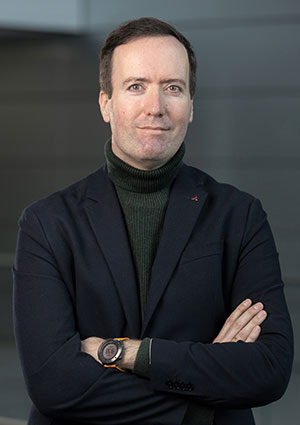
Mitsubishi Power’s Javier Cavada discusses implementing the energy transition and green technology with Steve Dobinson
Energy is everything to us. Almost every single avenue of our day-to-day lives is impacted by the availability of our supply. However, given that the sector is responsible for the majority of global carbon emissions, we could be at risk of dying at the hands of one of our key lifelines.
Climate change and the basis for the necessary energy transition is no longer a question of if or when, but, more so, how soon. Every day we tick closer to the imminent 2030 targets that have been established by major corporations across the world, but how clear of an indicator are they going to be for the ultimate cries for carbon neutrality by 2050?
 Steve Dobinson sits down with Javier Cavada, the President, and CEO of Mitsubishi Power EMEA, to explore his vast knowledge on the topic. In the lead up to his current position, Javier has spent two decades working across the energy sector, fueled by his hardcore-details-oriented mechanical engineering background.
Steve Dobinson sits down with Javier Cavada, the President, and CEO of Mitsubishi Power EMEA, to explore his vast knowledge on the topic. In the lead up to his current position, Javier has spent two decades working across the energy sector, fueled by his hardcore-details-oriented mechanical engineering background.
“My career has seen me headquartered in many countries across the world,” he begins. “I spent 17 years with Wärtsilä, during which time I worked my way to President of Energy Solutions. I was essentially responsible for bringing 200 years of working with diesel into the modern age of renewables. By the time I left, we had close to 20,000 people and had reached 70 gigawatts of output, having steadily moved across to clean tech and energy storage.
“Then I was appointed the CEO of Highview Power, where I remain a board director. While developing the long-duration energy storage business, we travelled around the UK, Australia, Latin America, the US, Central Europe, and the Middle East searching for solutions to fight against climate change, and for decarbonization.
“Then I joined Mitsubishi Power around two years ago, to lead the energy business for Europe, the Middle East and Africa,” Javier adds. “Although they are three very different regions, there is huge synergy between the consumers, operators, users, and culture. Europe is by far one of the most forward-thinking continents in terms of new technologies and innovation to support decarbonization. The Middle East, despite providing nearly half of the world’s fossil fuels, is also keenly focused on clean power today. It’s in Africa where we need to try and leapfrog to accelerate the transition.”
Collaborative ecosystem
For over 150 years, Mitsubishi Heavy Industries has been developing technologies that contribute towards society. This is something that Javier cites as being deeply embedded in the Japanese DNA of the group, which is still reflected in the company’s working culture today.
“We want to ensure that our operations have a positive impact on society for many generations to come,” he elaborates. “What better way than to reduce the planet’s carbon footprint? I’m proud to state that Mitsubishi Heavy Industries is the leading company in both carbon capture and the reduction of global CO2 emissions. We’ve accelerated the development of our technology over the last decade, by capturing carbon at the source and studying it to understand if we can create a value chain for it.
“There isn’t the time, money, or feasibility to just turn everything off and start again. We need to decarbonize the existing infrastructure, which carbon capture, storage, and utilization offer us. We have already implemented more than a dozen decarbonization projects, one of which is the largest in the world. We are currently investing heavily into how to create the hydrogen economy, but that’s the next step. For now, we need to attack at the source, so that we can continue to have a sustainable society and avoid damaging the progress or people’s way of life.
“But we cannot do this alone,” Javier states. “We’re ultimately a technology company. So, we work alongside financial partners, governments, off-takers, users; we really rely on the entire palette of colors within society. Together, we operate in a collaborative ecosystem to execute our projects and initiatives.”
With regards to the expertise that Mitsubishi Power is drawing upon in its endeavor to facilitate the energy transition, Javier cites four key elements: know-how, footprint, experience, and reliability.
“We are incredibly unique among our competitors, for the fact that we don’t commercialize new technologies until they’ve been tested in real circumstances for a minimum of two years. We simply have the largest focus on reliability and practice fact-based trust and the utmost diligence when it comes to evaluating our developments before exposing them to customers. As a result, each of our technologies has the highest levels of reliability in their respective markets.
“It’s just a case of delivering on your promises effectively. When we say that we can operate certain power plants using 100 percent hydrogen and have the capability to eliminate emissions at the point of generation, we mean it. It’s not a promise that we’ll do it one day; it’s a statement we make because we can deliver. In this case specifically, we are currently testing across different units. Some are running at 30 and 50 percent, but others are already realizing 100 percent. These aren’t just simulations; they’re made up of real nuts and bolts in the field.”
Positive impact
Despite the calls from many governing bodies, charitable organizations, and pressure groups for imminent action to tackle climate change, cynicism is beginning to grow within certain demographics about the intentions and actions of larger businesses. The term ‘greenwashing’ is readily bandied about to label such enterprises accused of capitalizing on certain simple or popular initiatives that don’t render particularly beneficial results.
“I’m lucky enough to be very present, through Mitsubishi Heavy Industries, at the UNFCCC’s COP events around the globe,” Javier says. “So, I feel that I can firmly state that those who are practicing greenwashing are being actively tracked down. Everybody is concerned, so it’s by no means time for tactical selling or unethical benefits based on a situation that’s affecting all of us. It’s almost 30 degrees in London today, which is of course lovely and sunny, but the abnormality speaks for something more sinister. Last year the temperature set new records, which I’m sure we’ll exceed in the coming years.
state that those who are practicing greenwashing are being actively tracked down. Everybody is concerned, so it’s by no means time for tactical selling or unethical benefits based on a situation that’s affecting all of us. It’s almost 30 degrees in London today, which is of course lovely and sunny, but the abnormality speaks for something more sinister. Last year the temperature set new records, which I’m sure we’ll exceed in the coming years.
“We’re seeing it all over the EMEA region, and some areas are more dramatic than others. The constant increases in temperature and the number of new climate events are impossible to ignore. I can see corporations and governments are rapidly becoming more aware of the seriousness of our situation, but it’s time to see their levels of awareness being matched by actions.
“The EU is currently working on new regulations that will maximize investment into green tech, similar to the Inflation Reduction Act in the US last year, which is pushing for more funding towards carbon capture and hydrogen technologies. Many industries are moving towards green credentials and the acceleration is great, but we’re not there yet. The next two-to-three years are going to be fundamental, as we begin to see tipping points arise in every sector.
“These things take time,” he continues, “when I was standing as the president at Wärtsilä, almost a decade ago, we were already pushing for a 100-percent-renewable future. It baffled the other stakeholders in the industry, as they couldn’t understand why a company so heavily focused on diesel and gas was advocating renewable energy. Following the Paris agreement, Mitsubishi Heavy Industries has committed to be carbon neutral by 2040, which is only 16 years away, so by 2030 we’ll be looking for significant results. This means a lot of investment, implementation, and development on our behalf, and on that of our entire supply chain.
“We see ourselves as being one of the biggest forces on the planet to help accelerate this journey, and there is no direction other than forward to reduce the global carbon footprint. The great news is all the requisite technologies are already available. Companies of our caliber already possess them in their portfolios; it’s just a case of deploying more and more volume to reduce their costs. It happened with gas turbines 30 years ago, solar 20 years ago, and wind ten years ago, and now it’s happening with hydrogen and capturing carbon. Delivery and investment are the solutions to feasibility.
“How we utilize natural resources defines how we develop as a society,” Javier concludes. “As individuals, we have an inherent responsibility to make a contribution towards the planet, the current generations, and those that will follow us. Those who come next need us to be more responsible, so that we can leave them with the most liveable environment possible. I see an enormous sense of togetherness in what we are doing, as there is no sector in any industry that is not affecting or being affected by the energy industry. We all need power, but specifically clean power. I feel great about the impact that we as a company are able to have.”